
Caring for Children with Autism Spectrum Disorders
Newly Diagnosed With An Autism Spectrum Disorder?
For many parents, an official diagnosis of Autism Spectrum Disorder (ASD) simply confirms what they had felt or suspected about their child. For others, a diagnosis may be met with anxiety or concern. What resources are available? Will my child have friends? Will she be able to live independently?
signs and symptoms of ASD
Start with the basics. If your child has ASD, they may have challenges with sensory processing, emotional responsiveness, social cues and communication, cognitive behavior, or medical issues, from tummy troubles to sleep disorders to seizures.
Empower yourself by asking all the questions you have from reliable, trustworthy sources. The Autism Foundation (https://www.autism-foundation.org) is a great place to start. Many communities have regional autism foundations that provide everything from caregiver support to legal advice to specialized summer camps. BIPOC families may wish to explore The Color of Autism Foundation for culturally competent support. (https://thecolorofautism.org)
caregiver stress
Parents and caregivers of children with ASD can suffer from severe stress and social isolation, and they may not have the bandwidth or support to maintain their own mental health. Parenting groups, counseling, and connecting with other families with ASD can provide emotional support, but what can parents who live in rural areas or inner-city areas without transportation and services do?
Remote skills training can teach techniques for adaptive functioning, communicating, playing, self-regulating, and building caregiver confidence. The nonprofit advocacy organization Autism Speaks offers a free caregiver skills training program at:
https://www.autismspeaks.org/caregiver-skills-training-program
Telehealth counseling can be an affordable, accessible option for parents and caregivers of children with ASD to learn to manage their own stress and self-care. Therapists use private, secure, videoconferencing to speak one-on-one with clients over the computer or phone.
tweens and teens with ASD
Adolescence is a challenging time for everyone. Hormones, feelings, and the anxieties that come from others’ expectations can be intense for tweens and teens. Parents of children on the autism spectrum know that if their children develop aggressive behavior, such as hitting, biting, scratching, or kicking, it is not the child’s fault and it is also very common. A study of aggression in children and teenagers with autism found that 68% had been aggressive to a caregiver, and almost half of participants had been aggressive to someone else. Aggressive behavior was apparent across genders and a wide range of intellectual functioning, but did appear more prevalent in children with insomnia and those with repetitive behaviors, who may react strongly and severely when their comfortable routines are disrupted.
Encouragingly, a 2015 study of adolescent maladaptive behaviors found that strong maternal connections and communication did improve ASD teens’ aggression. But it can be scary for a mom who is home alone with a 200 lb teenager with autism who is experiencing rage and frustration. Certain blood-pressure medications, anti-psychotics, and targeted behavioral therapies are helpful in reducing the severity of aggressive behaviors in some people with autism, but others continue to engage in behaviors that injure themselves and others. It can be exhausting for parents and caregivers who love these children but may feel helpless, overwhelmed, and afraid.
After working with children on the autism spectrum and their families for more than 5 years, Lifeologie Counseling Midlothian therapistAlyssa Solis has developed a passion for working with children, adolescents, and neurodiverse populations – and their parents and caregivers.
“Navigating through a new diagnosis may bring about anxiety and fear for a parent. If your child is demonstrating maladaptive behaviors and having difficulty regulating their emotions, this may contribute to added stress,” Solis says. “Here at Lifeologie Counseling, our therapists provide a safe environment where parents can feel supported as they explore the ambivalence they may be experiencing. Additionally, parents can be introduced to coping skills they can utilize when daily stressors become overwhelming. At Lifeologie, we emphasize the importance of a collaborative counseling experience. A plan of care is uniquely created to provide you with the best treatment to help with your current challenges as a parent of a child with ASD.”
Learn more about Alyssa Solis here, read her advice for transitioning back to school with children with ASD, check out our similar blog, Your Child Was Diagnosed With Autism Spectrum Disorder, Now What? and meet all of our Lifeologie Counseling therapists who specialize in working with our neurodiverse population.

About Lifeologie
Lifeologie Counseling was founded in 2000 with one goal in mind — to bring a fresh, innovative approach to the everyday problems of life. Creative solutions to stuck problems®. With our unique multi-specialty, collaborative approach, Lifeologie Counseling helps individuals and families heal their wounds and break out of old, unhealthy patterns.




